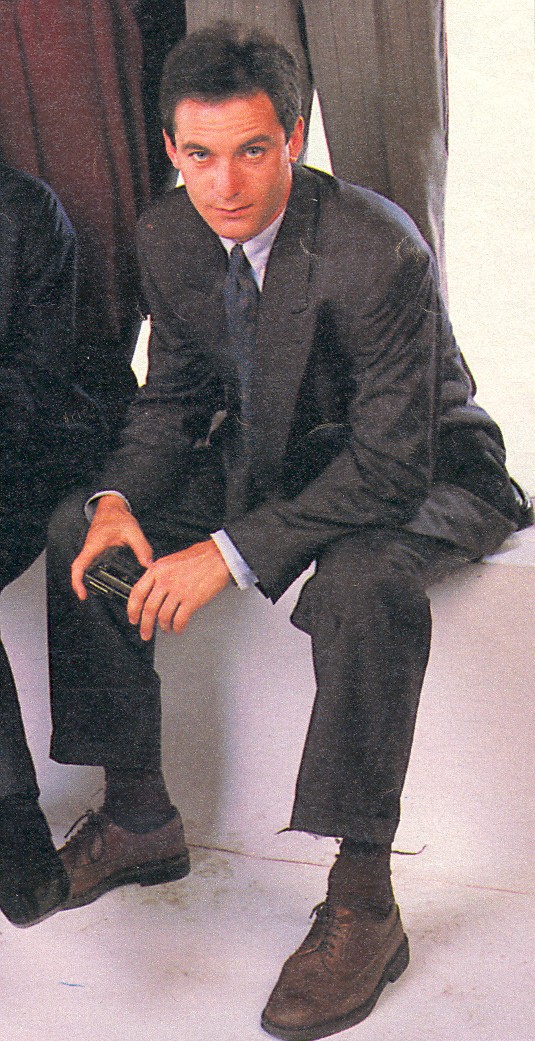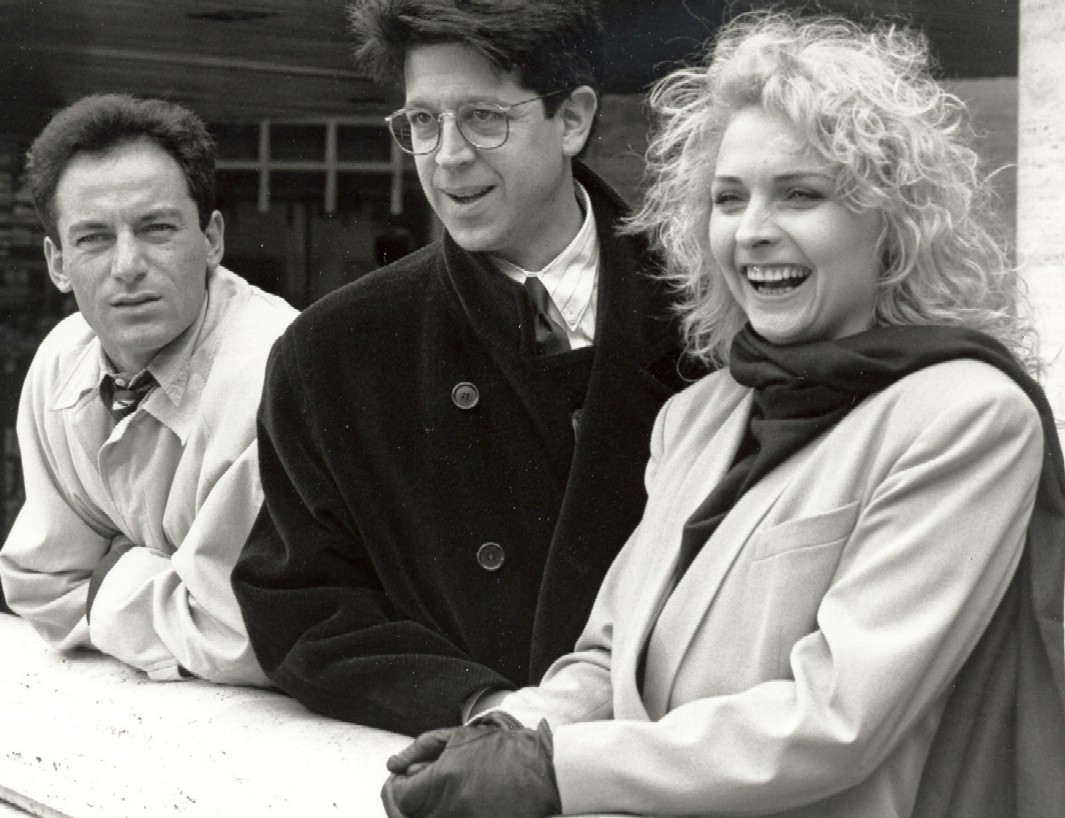TVTimes September 1989
And They Call It
Yuppie Love
Adrian Furness meets the
stars of Capital City.
Original Picture by David Magnus
(click to enlarge)
|
There are, said Doctor Johnson, ‘few ways in which a
man can be more innocently employed than in getting money.’ With that thought as your guide, walk
across the back lot of Elstree Studios, duck through a couple of shabby
doors, and stroll down a dingy passage.
You pass a wardrobe room with rails of £600
suits, silk blouses, silk ties…and suddenly you get a whiff of money. You are approaching the main set of Capital
City, a 13-part series about the staff of Shane Longman, a London
merchant bank. The set is the bank’s
dealing room, all marble and plush fittings, and lit by the dollar-green glow
of computer screens. Here, innocently employed in getting money, is Jimmy,
nasty Jimmy. He’s 22, and only too
happy to stitch up someone to make a fast buck. Over there is the swash-buckling Declan, golden boy of the
bank, who picks up girls by ramming their cars; and beautiful Sirkka, who
hits the bottle and, occasionally, the customers; sweet Michelle, who is so
nice her Porsche is 10 years old; brilliant Max Lubin, who speaks nine
languages; and serious Hudson J Talbot III, an American whose wife has left
him holding the baby. All
high-flyers, Big Bang heroes whose deals could bust a bank or cause a blip in
the economy. They are remarkably
young. ‘When I was researching the series,’ says producer
Irving Teitelbaum, ‘I found that most dealers are finished by their early
30s. Maybe they’re burnt out. Or maybe they become apprehensive. To make money you have to deal in the most
enormous sums because the margins are tiny.
If you’re a currency dealer, for instance, you might be handling £750
million worth in a day. Perhaps as
you get older the responsibility of that starts to hit you.’ Douglas Hodge, 29, who plays senior trader Declan
McConnochie, has another view: ‘I reckon that by the time they’re 30 they’re
either lying in a gutter or they’ve earned enough to go and buy their
farmhouses and retire. We all went
down to visit a real merchant bank and chatted to the dealers about how much
they earned. We heard figures like £100,000
a year plus bonuses, which might add up to as much again, at which point we
fell off our chairs. I mean, these
people were all in their mid-20s. ‘On the other hand, I can’t think of a less attractive
way to earn money. In one way it’s
similar to acting. There are the same
long periods of inactivity and then suddenly its like someone shouted
“action! That’s when you have just
five minutes to make a killing. If
you don’t sell you start losing money, and if you lose money you could lose
your job.’ The mind-boggling deals
are, however, are only a strand that runs through the plots. ‘It is not,’ says Hodge, ‘a series about
greed, but about young people who earn perhaps more money than they know what
to do with, who work hard and play hard.’ As much as anything, Capital City is about the
pangs of yuppie love. Declan, like most of the characters, lives alone. ‘He adores women in a big way,’ says
Hodge, ‘but I suppose he is kind of in love with Michelle Hauptmann [played
by Trevyn McDowell]. She’s the passion
of his heart. He can’t understand why
she won’t throw everything up and come and live with him. Of course he has several other passions as
well…’ One of those passions is Sirkka Nieminen, a senior
trader from Finland. She is played by
Polish actress Joanna Kanska.
‘Sirkka,’ says Joanna in a strong Polish accent, ‘is a powerful lady,
very ambitious. I wish I could be so
ambitious, so strong. I am more modest and shy. You have to be a certain kind of person in the city to cope
with the pressure. You need guts and
knowledge, and you must trust your judgment.
Not everyone can cope. And
women have to be twice as good as the men.’ |
Presskit Photo
(click to enlarge)
|
Joanna knows the City. She came to England for a holiday when she was 23, met a fellow
Pole, and stayed. (‘We’re
hot-blooded, we Poles,’ she says.)
For the first few yeas she spoke nothing but Polish. ‘Then I went to work as a barmaid in a
wine bar in the City, and that was where I first heard proper English. I made friends with City traders, listened
to the stories, watched how they behaved.
When this series came up, I spent several days in their dealing
rooms. Now I know how they behave,
but I still don’t understand what they do.’ Over to Dorian Healy, who plays nasty Jimmy
Destry. ‘Look,’ he says, ‘I know a
bit about dealing and there’s nothing very elitist about it. You could be a barrow boy and do well on
the Stock Exchange. It’s just whether
you’ve got the nerve, really. We
could go down to Deptford Market now with a bunch of dodgy pots and pans, and
it’s us against all the other guys in the street. You’ve got to wheel and deal, and that’s what someone like
Jimmy does, only he’s buying and selling bits of paper for £150
million instead of pans for £1.50. ‘Jimmy’s good at it. Screws up other people’s deals, pinches
their business, wines and dines older women clients…though I think he’d
secretly like to get off with Sirkka or Michelle - Sirkka because she’s the
boss and Michelle because she’s Declan’s girlfriend. Jimmy hates Declan. ‘See my suit? It’s an Armani. I get to wear a lot of swish suits in this
series but I don’t’ think they’ll be worth keeping when we’ve finished
filming…Jimmy tends to get beaten up rather often.’ ‘Jimmy,’ according to Jason Isaacs, who plays his
flatmate and fellow junior trader Chas Ewell, ‘is a complete rotter. Chas is much more sensible, though he’s as
psyched up and neurotic as the rest of the dealers. You would be neurotic if you were very young, earning
about £60,000 a year plus bonuses,
and could get the chop at any moment. “There are still people making fortunes in the City. It’s not true that after Black Monday [when
the Stock Market crashed in October 1987] all the Porsches went back to the
dealers and the Docklands flats to the receivers. It’s just harder now.
People have to earn their money.’ There’s a young and elegant group lounging at the back
of the studio. Until recently, they
were all ‘Something in the City’. Now
they’re extras and advisers on the series. ‘Reports of salaries in the City are grossly exaggerated,’ says Charles Meyrick, who use to be a broker. ‘Much of what you earn is commission, and you have bad months as well as good. When you have a bad month you ignore your pay cheque. When you have a good month you multiply that by 12 and say, “This is what I’m earning a year. It’s a rat race and I have not intention of going anywhere near it again.’ Perhaps, after all, the smell of money isn’t so sweet. | |
Jason Isaacs Online |
Visit My Realm
|


